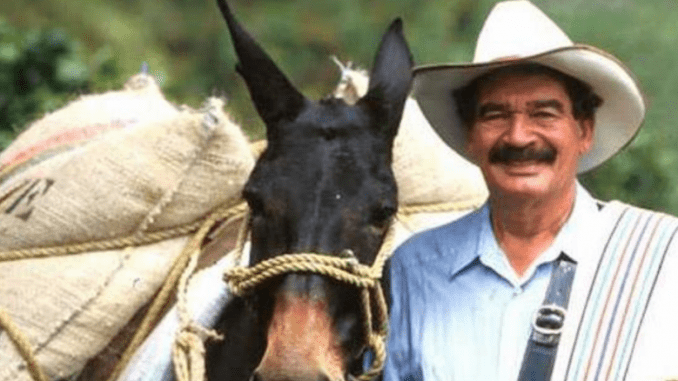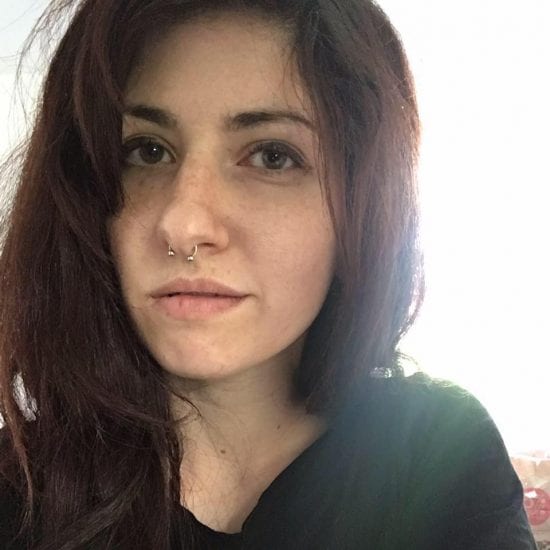
Juan Valdez is the fictional everybody representing Colombian coffee farmers. We get to know Carlos Sanchez, the man who played his part and recently passed away.
BY MANDY SPIRITO
SPECIAL TO BARISTA MAGAZINE
The name Carlos Sanchez may not ring a bell, but Juan Valdez likely does. Sanchez, who recently passed away, is best known for his decades-long portrayal of the highly popular Colombian coffee icon. Though not the first to don Valdez’s iconic hat and poncho, Sanchez is the most enduring and well-known iteration of the character.
A coffee farmer himself before turning to acting and painting, Sanchez devoted himself to portraying Juan Valdez as an “honest, hardworking, traditional” coffee grower, helping to demystify the process of coffee production for millions. Though easy to mistake for a cliché, Juan Valdez’s— and Sanchez’s—contributions to the industry are hugely important. At a time when C-market prices are hitting new lows and, in many cases, result in producers being paid less than the cost of production, the world needs humanizing characters like Juan Valdez more than ever—representing the powerful idea that knowing one person can radically change how we think.
When the National Federation of Coffee Growers of Colombia (FNC) created the character in 1960, it was with the intention of highlighting 100 percent Colombian coffee and differentiating it from the blends and lower-quality coffee prevalent in the consumer market. At the time, the United States purchased the most coffee of any country in the world, yet most consumers had no idea how their daily cup came to be, let alone that it could have a taste of place. Blends of the mid-20th century were fairly Robusta-heavy and largely unpalatable—hence the need for milk and sugar. Juan Valdez offered something different—milder and higher-quality coffees. Looking for a better cup, consumers took to the proposition right away.
From newsprint to the airwaves, Juan Valdez introduced the world to the production process in layman’s terms, educating consumers about the hard work and care necessary to grow high-quality coffee. He emphasized Colombian coffee’s quality and flavor characteristics, along with the painstaking attention required throughout cultivation and processing. He earnestly posited that coffee would be more enjoyable because of this emphasis on quality. People listened and believed him because Juan Valdez was thoroughly approachable, and always portrayed excellence as being achievable through simplicity.
Early commercials featured Valdez working through each step of coffee production with quiet intention, straight down to hand-stitching the jute bags. Later commercials continued to emphasize this no-frills approach to coffee quality. One ad even featured a line of customers in a café placing overly complicated orders (very prescient for 1996), until one person states “I’ll have what he’s having,” and the camera pans to Valdez reading a newspaper with Conchita, his trusty mule (health code be damned).
The character kept up with the times, becoming a little sillier in the ’90s (with any luck, his catchphrase “grab life by the beans” won’t be lost to posterity). The savvy marketing continues, as evidenced when Sanchez stepped away from the role and a massive American Idol-esque search for his replacement ensued. Today, Carlos Castaneda, who grew up working on coffee farms and owned one of his own, carries on the work.
C-market prices are currently hovering around an unsustainable $1 per pound. This level barely—if at all—cover the cost of production (even with a quality differential added on). Low prices negatively impact the livelihood of producers, push them out of business, and make coffee even more vulnerable to climate change by limiting resources. There is an ongoing need to address and improve how coffee is traded and how money exchanges hands, but in the short term, we also need to introduce people to the realities of coffee production and help a new generation of coffee consumers embrace the people who produce the beverage we all love so much.
Baristas can relate to the frustrations of trying to reduce a difficult and complex conversation into one sound bite, but characters like Juan Valdez open the door to that awareness and, in the process, make it all a bit simpler and a lot more human.

ABOUT THE AUTHOR
Mandy Spirito is a roaster from all over the U.S. (seriously, it’s hard to pinpoint an origin). She also runs social media for She’s the Roaster.

